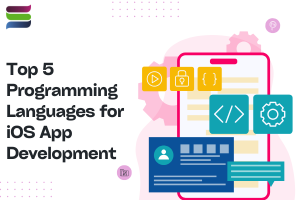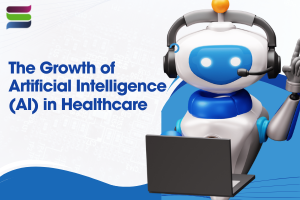How Artificial Intelligence is Impacting the Sports Industry
Update on 22 Sep, 2025 by Spectrics Solutions

In recent years, AI has changed many industries, including sports. From enhancing athlete performance to creating smarter fan experiences, AI is shaping the future of how games are played, watched, and managed. As Artificial Intelligence grows, sports teams and businesses are using AI tools to stay ahead and achieve better results.
At the core, Artificial Intelligence is about using data-driven technologies to simulate human intelligence, helping organizations make better decisions and streamline processes. In the context of sports, this means analyzing vast amounts of data, predicting outcomes, personalizing fan engagement, and optimizing training methods for athletes. With the support of a trusted Artificial Intelligence Development Company like Spectrics Solutions, teams and businesses can harness AI effectively and ensure they don’t fall behind in the fast-changing landscape.
Athlete Performance and Training
A major way AI is changing sports is by helping track and improve athlete performance. Using wearable devices, motion sensors, and video analysis, AI can collect real-time data about an athlete’s movements, stamina, and technique. Coaches and trainers can use this data to see what athletes do well, find areas to improve, and create custom training plans. This helps athletes stay safe from injuries and perform at their best.
For example, AI systems can analyze how a player runs, kicks, or swings, and then suggest improvements. This goes far beyond traditional coaching by using precise data instead of guesswork. Many professional teams now rely on AI-powered tools to ensure their athletes maintain peak physical and mental condition.
Injury Prevention and Recovery
Injury is one of the biggest challenges in professional sports. Artificial Intelligence is playing a crucial role in predicting and preventing injuries. AI algorithms can process data from sensors and past injury records to detect patterns that indicate a higher risk of injury. Coaches can then reduce an athlete’s workload or adjust training routines accordingly.
Additionally, during the recovery process, AI-driven rehabilitation systems track healing progress and suggest the most effective exercises for quicker recovery. This level of precision in medical care is possible only because of advanced Artificial Intelligence development in the sports industry.
Fan Engagement and Experience
Sports is not just about athletes—it’s also about the fans. AI has significantly changed the way fans experience games, whether at stadiums or online. Personalized recommendations, AI-powered chatbots, and virtual assistants allow fans to access information, buy tickets, and even interact with their favorite teams more easily.
Streaming platforms are also using AI to provide personalized viewing experiences. For example, fans can get customized highlights of matches, depending on whether they want to see only goals, wickets, or key moments. This makes sports more engaging and keeps fans hooked. With the help of an Artificial Intelligence Development Company like Spectrics Solutions, sports organizations can build AI-driven platforms that enhance fan loyalty and create better engagement strategies.
Data-Driven Coaching and Strategy
Coaches no longer depend only on intuition and experience. Today, AI is being used to study game patterns, analyze opponent strategies, and suggest winning game plans. For example, AI models can predict how a player might respond in a specific situation, allowing coaches to make more informed decisions.
These AI-driven insights give teams a competitive advantage, helping them refine their strategies during training sessions and even in the middle of matches. The ability to make real-time decisions using AI data is proving to be a game-changer in professional sports.
Refereeing and Fair Play
Controversial decisions by referees have always been a part of sports, but AI is helping reduce human error. Technologies like VAR (Video Assistant Referee) in football or Hawk-Eye in tennis are powered by Artificial Intelligence. These systems analyze match footage with extreme precision, helping referees make accurate decisions.
As AI development continues to improve, we can expect even more advanced tools to support referees and ensure fairness in sports. With AI Development Services in Ahmedabad offered by Spectrics Solutions, organizations can explore custom solutions to improve match officiating and maintain credibility.
Business and Management in Sports
Behind the scenes, AI is also making sports businesses more efficient. From ticket sales and stadium management to merchandise promotions, AI helps organizations understand consumer behavior and optimize operations. Predictive analytics can forecast ticket demand, while AI-driven customer service ensures fans get quick support.
Also, sponsorships and marketing campaigns now rely more on data. By analyzing fan behavior and engagement levels, AI can help brands and teams create more effective campaigns that connect with their audience.
The Role of Artificial Intelligence Development Companies
Implementing AI in the sports industry requires the expertise of a reliable Artificial Intelligence Development Company. Firms like Spectrics Solutions provide tailored AI Development Services in Ahmedabad and beyond, helping sports organizations adopt AI solutions that fit their unique needs. Whether it’s building smart analytics platforms, fan engagement systems, or athlete tracking solutions, Spectrics Solutions ensures that businesses can unlock the true potential of Artificial Intelligence.
Final Thoughts
Artificial Intelligence is not just a technological trend—it is reshaping the entire sports ecosystem. From improving athlete performance and preventing injuries to enhancing fan experiences and streamlining business operations, AI’s impact is undeniable. The sports industry is becoming smarter, fairer, and more data-driven thanks to the advancements in Artificial Intelligence development.
As technology continues to evolve, working with an experienced partner like Spectrics Solutions, a leading Artificial Intelligence Development Company, ensures that organizations can stay ahead of the curve. With specialized AI Development Services in Ahmedabad, businesses can build innovative, reliable, and scalable AI-powered solutions that will define the future of sports.
In short, Artificial Intelligence is no longer the future of sports—it is the present, and it’s changing the game for everyone involved.



